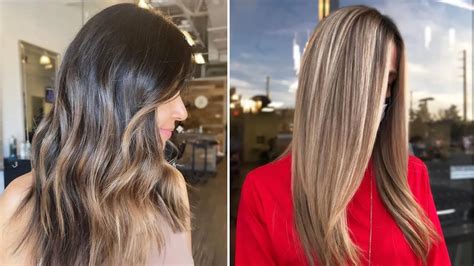From sun-kissed strands to bold, dramatic streaks, hair lightening techniques have become an essential part of the beauty landscape. While balayage and highlights are both popular options, they offer distinct looks and have their own unique advantages.

1. Application Techniques: A Brush vs. Foil
Balayage:
Involves freehand painting hair with lightener, creating a seamless gradation of color that resembles natural highlights.
Highlights:
Uses foils or plastic caps to isolate strands of hair and apply lightener, resulting in more defined and precise streaks.
2. Resulting Effects: Subtle vs. Statement
Balayage:
Produces soft, blended highlights that mimic the sun’s natural lightening effect, creating a natural and effortless look.
Highlights:
Delivers bolder, brighter streaks that contrast with the base color, resulting in a more dramatic and defined style.
3. Maintenance: Low vs. High
Balayage:
Requires less frequent touch-ups (typically every 12-18 weeks) because the regrowth blends more gradually into the natural hair color.
Highlights:
Needs more regular touch-ups (every 8-12 weeks) as the contrasting color of the highlights becomes more noticeable with regrowth.
4. Suitability: Versatility vs. Specific
Balayage:
Suitable for almost all hair types and textures, creating a natural-looking effect that complements various face shapes and skin tones.
Highlights:
Best for fine hair or those desiring bolder, statement-making highlights. Can be customized to suit specific face shapes and features.
5. Cost: Affordable vs. Premium
Balayage:
Typically more expensive than traditional highlights due to the labor-intensive application technique.
Highlights:
Generally more affordable, especially for partial or full highlights.
Balayage vs. Highlights: Which One Is Right for You?
The optimal choice between balayage and highlights depends on your desired look, hair type, and lifestyle.
Consider Balayage if:
- You prefer a natural, sun-kissed effect.
- You desire a low-maintenance hair coloring technique.
- You have thick, coarse hair or a longer hair length.
Consider Highlights if:
- You want bold, defined streaks of color.
- You are looking for a more dramatic and transformative style.
- You have fine hair or desire a more precise highlight placement.
Pros and Cons at a Glance
| Feature | Balayage | Highlights |
|---|---|---|
| Application | Freehand painting | Foils or plastic caps |
| Effect | Soft, blended highlights | Bold, defined streaks |
| Maintenance | Low | High |
| Suitability | Versatile | Best for fine hair or bolder highlights |
| Cost | More expensive | More affordable |
Table 1: Comparison of Application Techniques
| Feature | Balayage | Highlights |
|---|---|---|
| Application method | Freehand painting | Foils or plastic caps |
| Precision | Less precise | More precise |
| Timing | Time-consuming | Less time-consuming |
| Experience required | Higher skill level | Lower skill level |
Table 2: Comparison of Resulting Effects
| Feature | Balayage | Highlights |
|---|---|---|
| Color distribution | Blended, seamless | Defined, contrasting |
| Naturalness | Mimics natural highlights | Bold, statement-making |
| Coverage | Less consistent | More consistent |
Table 3: Comparison of Maintenance Requirements
| Feature | Balayage | Highlights |
|---|---|---|
| Re-touching frequency | Every 12-18 weeks | Every 8-12 weeks |
| Regrowth appearance | Gradual blending | More noticeable contrast |
| Damage potential | Lower | Higher |
| Upkeep cost | Lower | Higher |
Table 4: Comparison of Suitability and Cost
| Feature | Balayage | Highlights |
|---|---|---|
| Hair type | Versatile | Best for fine hair |
| Face shape and skin tone | Complementary | Can be customized |
| Cost | More expensive | More affordable |
